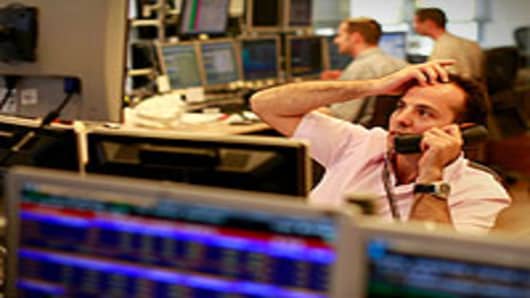Stocks tumbled around the world Wednesday as investors were rattled by efforts in the US and Europe to tighten regulation of financial markets.
The selloff was sparked by Germany's decision late Tuesday to ban naked short-selling of certain financial instruments and comments from its chancellor on Wednesday on the safety of the euro.
The German ban, which affects euro-denominated government bonds, credit default swaps based on those bonds and shares in the country's 10 leading financial institutions, appeared to catch its partners in the European Union off guard, who said they were not consulted.
In naked short selling, a trader sells a financial instrument, betting that its price will fall, without first borrowing the instrument or ensuring that it can be borrowed, as in a conventional short sale.
This came as US regulators proposed new rules to halt trading during major stock selloffs and the Senate prepared to vote on new regulations for financial markets.
"The markets never like governments interfering in what they regard as the efficient running of markets,'' said Bill McNamara, analyst at Charles Stanley in Sweden. "It just doesn't settle the nerves in the way politicians seem to think it will. Investors should continue to expect high levels of volatility.''
European shares fell by 2 percent or more to the lowest close in two weeks as Germany's move sparked concerns of tighter regulation. Asian stocks also lost ground on worries about regulatory moves in the US and Europe.
US stocks also were sharply lower on worries about new regulation and the dollar's fall against the euro.
Earlier Wednesday, the euro hit a four-year low against the US currency after German Chancellor Angela Merkel said the euro was in danger.
The euro bounced back, however, on speculation that the European Central Bank was considering intervening to support the currency. The rally also was fueled by rumors that Greece is considering leaving the European Union, which a government spokesman denied.
Despite the euro's rebound, assets perceived as being risky mostly fell in price as concerns that Germany's move heralded tighter financial regulation, boosting risk aversion.
Crude oil slid to $69 a barrel and gold prices shed about 2 percent.
"It's all financial markets-driven," said Carsten Fritsch, commodities analyst at Commerzbank. "The news regarding short-selling was quite surprising and it led to a rapid strengthening of the US dollar and falling equity markets, and this affects commodity prices."
US Treasury prices rebounded from early losses as the stock market's slide revived investors' appetite for safe-haven U.S. government debt.
—Reuters contributed most of the reporting for this article



